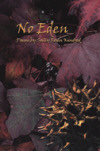No Eden
Kindred’s poems are carefully composed examples of the successful intersection of lyric and narrative impulses. No Eden opens with “Prayer for Mrs. Snead,” which is representative of the poet’s style and sets the tone for the collection:
Kindred’s poems are carefully composed examples of the successful intersection of lyric and narrative impulses. No Eden opens with “Prayer for Mrs. Snead,” which is representative of the poet’s style and sets the tone for the collection:
Out of thorn-apple, out of love-apple,
out of bramble-fruit like green ice
comes the heaven I wish for Mrs. Snead
who held me in the hard-work breath
of Greensboro mills till I’d sleep…
…on Mrs. Snead’s last day
that is almost what I saw: her body at its center
holding me, holding any of us close, and
all around, her Ashley, James and Fritz, reaching in
under drifts of blooms, playing not harps or flutes
but scratched windows of fruit, God as green
delicious as her hands had always been.
Many of the poet’s preoccupations and tendencies present themselves in this first poem, among them a changing and changeable relationship with God and the language and imagery of Christian religious tradition; the world as it can be understood “in color” (“God as green”); the balance of everyday living (and dying) between joy and grief; the experiences of childhood; and the southern landscape of the poet’s childhood. Drawn often, initially, to distress, anger, frustration, grief, or despair (her own or others’), the poet is inevitably redeemed, as in the first poem, by a sense of purpose, joy, and expansiveness. Here are the final lines of “To Noah”:
Do not speak of covenants
or gifts made out of sky.
Look at what survives the journey
into broken weather, broken story:
look at each face and into the wilderness eyes
and across the teeth and down to the hands
of your own righteous hungry people and ask them
to lift the garnet lanterns
and lead you all the way back up into this world.
In Kindred’s work personal stories merge with biblical ones, as in “Seven Sorrows,” in which she links the experience of desiring another child to Lilith and Eve; the experience of sex to “holy darkness”; and an experience with her mother to Mary, “the mother of seven sorrows.” Life’s saddest moments, and it’s most joyous, are presented often in their relationship to the presence of God. “Sad pear, God gave you / no fine story,” begins the poem “No Eden.” “We won’t need to climb / the desert pine. We might walk all the way / around it, thumbing faces in the bark—milagros—we might lift our heads,” she concludes in “Mercy on Pecos Road,” the final poem in the collection. (Milagros means miracles.)
Kindred’s poems are poignant and often elegant. Here is “Yearn” in its entirety:
Twenty-five years and I want beets
at my mother’s table, beets on a white plate.
And want my small shoes drifting
beneath the wood, my hands reaching for things
they still can’t touch. Blue china chicken
at the center, where is your shine?
Take this grief and feed it back to me,
dark burgundy taste of my mother’s soil and sleep.





